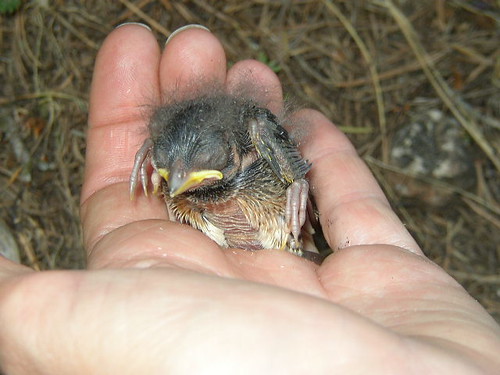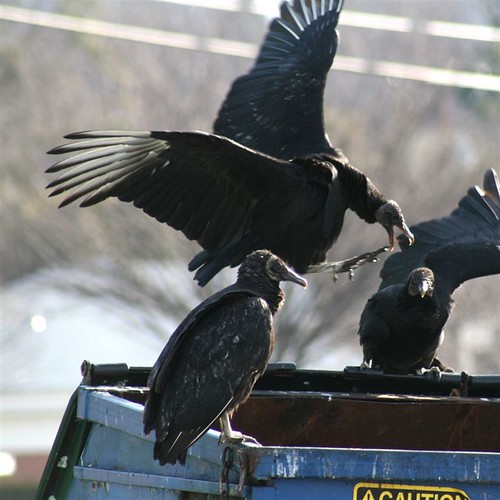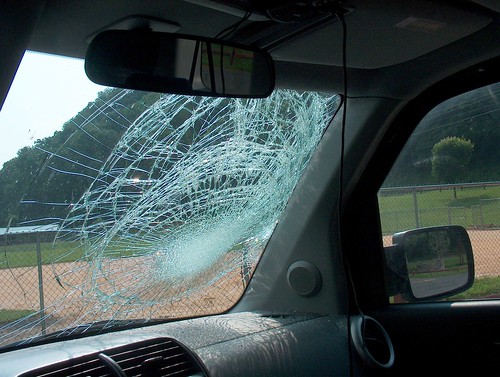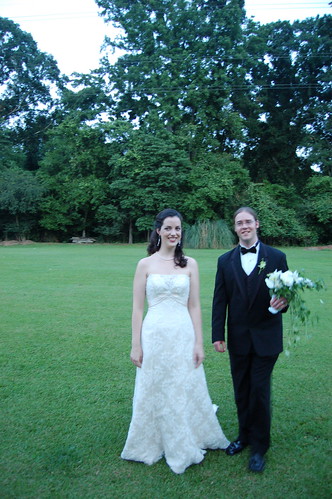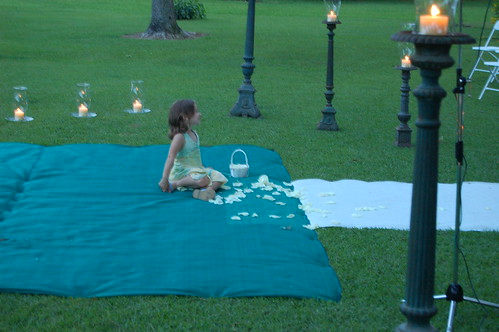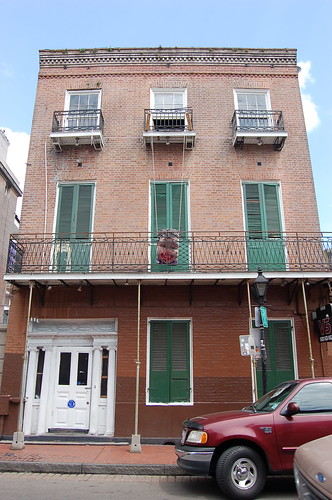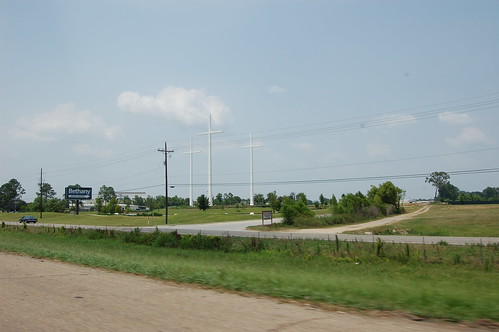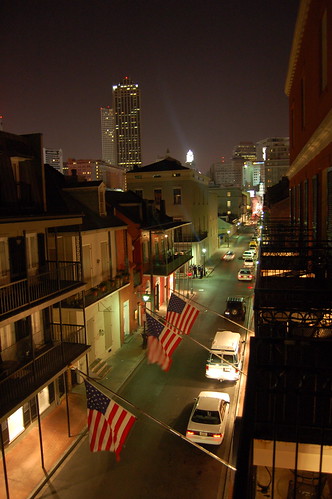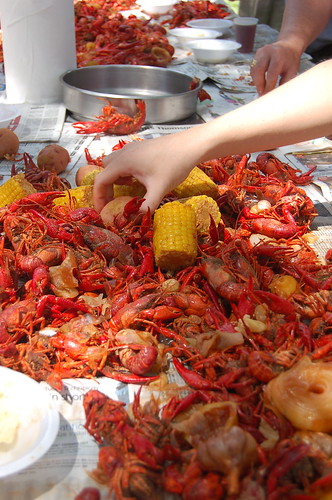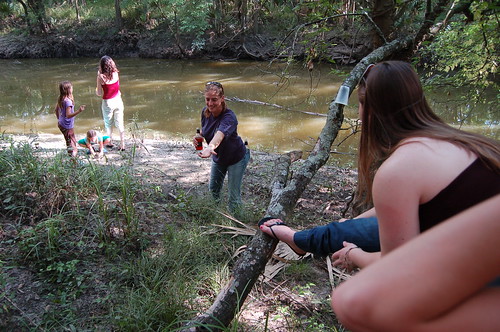To see all Bird Camp-related posts, please click on “Bird Camp” in the categories list to the left.
When last we left our hero and my wife, A., she was waiting for the last of her crew to report, looking forward to “probing [her] first eggs,” and worrying that she might have to shoot some squirrels. Since then, all of the approximately two dozen employees and grad students have finally arrived, trickling in from native countries as far afield as Canada, the Bahamas and Taiwan. Unfortunately, three staff members have had to leave: one experienced a death in the family, one experienced the recurrence of a herniated disk, and one decided to pursue a different employment opportunity. These departures have resulted in three “projects” having to be abandoned; unfortunately, my notes – scribbled late on Sunday night in Baton Rouge – are not detailed enough to let me explain what those “projects” consist of. We may be talking about the closing of three plots where research had been planned, but A. will have to confirm that.
But otherwise, work continues apace. Everyone has been assigned plots and tasks. Everyone has been trained in nest searching, the most overarching activity of the project, though certain crewmembers are engaged in the more specialized tasks of mist netting (catching and banding a sampling of whichever kinds of birds fly past a given point, with a filmy net shaped sort of like a volleyball net), target netting (catching and banding specific kinds of birds by placing a mist net near their nests), and mammal trapping. The main purpose of banding is to be able to see how long banded birds survive and where they end up. Obviously, some already banded birds will be caught in the above operations; when they are, various statistics are recorded and added to that bird’s life history record before it is released. (The same statistics are recorded as a baseline for a newly netted bird.)
The squirrel-shooting operation I mentioned last time was suspended, in the end, because they discovered that they had gotten started on it too late in the season to achieve the desired goal. The idea had been to decrease the number of predators of bird nests (i.e., of eggs) in certain of the project’s plots in order to see how much of an effect this form of predator is having on the birds’ successful reproduction. I know, you’re thinking, squirrels eat eggs? As I was typing this out, I second-guessed my notes, wondering if I could possibly have that right, but it looks like I do. Also, remember that squirrels aren’t the only small mammals in this region who like a nice egg now and then, but trapping is sufficient to remove mice and the like. However, “squirrels don’t trap well,” A. explained last time.
I was mistaken, when last I wrote about this squirrel-shooting plan, in my explanation that the goal was to eliminate the squirrels from an enclosed – i.e., fenced – area. I assumed that this was the case because I didn’t understand how else you could keep the squirrels from returning. But in fact, as A. points out, it was absurd of me to think that there is any practical form of fencing that could keep squirrels out of a piece of forest land – the fence would have to be taller than the surrounding trees and electrified to boot, plus there would need to be no openings bigger than maybe two inches across. Impractical, to say the least, and besides, whoever is capable of building a fence like that should just report immediately to our southern border.
What’s interesting is that such extreme steps are not necessary, and neither is an ongoing shooting campaign. Apparently, squirrels have the extremely sensible instinct to avoid areas where they find no signs of other squirrels. It’s not that they want to hang out up close and personal with other squirrels – as anyone who has ever sat for a while in a city park can attest, these animals can be intensely territorial – but they seem to want to hear/see/smell that other squirrels are at least in the vicinity. Otherwise, they (have instincts that make it appear as if they consciously) worry that there might be an efficient predator in the area. So if you manage to eliminate them from one area early enough, the population there will never get a claw-hold and you’ll have a largely squirrel-free plot; then you can compare how nests fare there compared to other plots, where the squirrels are allowed to live unmolested. Another question is simply whether the birds behave differently in the absence of these predators. Perhaps they have lower “energy costs” each day that, in turn, allow more attention to other possible dangers, and so on.
But as I say, they got started too late in the season to achieve the desired effect. Oh, well. There’s always next year.
The professor in charge of Bird Camp made his seasonal visit soon after everyone had arrived. He typically only stays a few weeks in the early part of the season, just to make sure the training is proceeding as he wants and to give some lectures on the goals and findings of projects like this one. While there, he did indeed teach A. to probe eggs, although I must make another retraction: egg probing does indeed result in the death of one egg (but maybe a squirrel would have eaten it anyway?). Egg probes are set up by making a tiny hole in the shell and inserting the needle-like probe about halfway. Super-glue is used to seal the probe in place. The probed egg is then put back into the nest, in the center of the clutch, or group of eggs. A wire is led from this probe out of the nest, carefully concealed from the bird, and connected to a small data recording device; these devices are collected on a regular basis so that their data can be downloaded into a computer back at the camp. I was also wrong when I described this process as functioning like some sort of amniocentesis for birds; in fact, all that is being monitored is the temperature at the center of an egg in a given nest throughout the incubation stage – just another piece of data that allows you to comment on what did or did not lead to one nest’s success over another. But speaking of amniocentesis-like processes, at the request of another professor interested in analyzing hormones (androgen, specifically) in the developing eggs, the Bird Camp crew is collecting some of [whatever you call the stuff inside of an incubating egg].
About a week into the start of work, a human-caused fire on the Rim closed off a section of forest and prevented the crew from accessing five plots for about two weeks. The fire was 100-percent contained by the time A. left for last week’s New Orleans/Baton Rouge trip, but this is a circumstance that will continue to arise, with increasing frequency, for the rest of the season. Forest fires break out in this area all the time, some caused by humans but most by lightning strikes that easily ignite vegetation that has been dried out by the summer sun. For those of us who don’t live in fire country, it is easy to form the impression that there are only a few forest fires a year out west, but we only hear about the fires that are particularly large and/or which threaten human settlements. In fact, according to Wikipedia, “wildfires burn 4.3 million acres (17,000 km²) in the United States annually.”
When I visited Bird Camp last year, the Forest Service radios the researchers carry were crackling almost continually with conversations between fire-spotters in towers and Forest Service rangers on the ground as they tried to locate and evaluate the various fires that kept cropping up. Two or more towers in different locations would first compare compass angles on smoke sightings. (Otherwise, their directions to the rangers would be something like “there’s fire in the woods somewhere to the west of me, give or take 100 miles, go find it”; with sightings from different angles, it is possible to draw lines on a map whose intersection will give a more precise location). Then the rangers would drive out and see if the fire needed putting out, which not all of them do, of course.
I also asked A. to tell me what her typical day is like.
3:45 a.m. – Up and at ’em. Breakfast of oatmeal and hot cocoa in the military-style kitchen tent. (Some people cook eggs and the like, but A. doesn’t want to have to fuss around that much so early in the morning.)
4:30 a.m. – Vehicles (SUVs and a van) depart in various directions to drop everyone at their plots. A. typically drives one of these as she needs to remain mobile, visiting many different sites, throughout the day.
5:00 a.m. – Everyone should be on their plots and working by this point (around the time my alarm clock is going off, and I thought I liked to get up early). A.’s daily tasks include checking on nests that have already been located, finding new ones, and setting up egg probes and the video cameras that are used to capture predation of eggs as well as bird behaviors.
12:00 p.m. – Everyone is picked up and brought back to camp for lunch (after a nice seven-hour workday so far, remember). Most of the crew members’ shifts end after lunch, with the copying of information collected on “field cards” onto the “home cards” that never leave the work tent and serve as a sort of daily backup file (analog, baby, analog). But some people have egg and nestling measurements to make, and most of the crew is – so far – so gung-ho and curious and helpful that just about everyone volunteers to help with this. Other afternoon activities include looking into nests with “peeper cameras,” jury-rigged little camera cells on the end of long poles than can be held up over nests, and cavity-nest access. Cavity nesters are birds that build their nests inside hollow parts of trees, and they aren’t safe from snooping either, though this is easier said than done. Researchers must assemble special stackable ladders to scale the trees, sometimes as high as 20 feet off the ground, and use a reciprocating saw to gain access to the nest. A. reports that this is strenuous work that “hurts your arms from all the vibrations.” As a last task before dinner, A. makes up the next day’s schedules and decides which vehicles need to go where, depending on terrain and how many people need to get to the various plots.
6:30 p.m. – Dinner. After dinner, A. downloads data from the egg-probe data recorders, hangs with her crew, answers questions, gives impromptu training, relaxes a little. Some crew members have cars and might leave camp now, maybe to drive to the Rim to make phone calls, maybe to make a personal errand, although it’s about an hour’s drive to the closest store, a little general store and gas station that constitutes “downtown” Happy Jack (and serves as the post office, so that’s where your letters go, assuming you’re writing – you are writing, aren’t you?).
9:00 p.m. – Bedtime. Zip into the tent, curl up in the sleeping bag, try to rest up for another long day.
Jeez, I need a nap just writing about all this.

